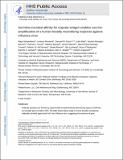Germline-Encoded Affinity for Cognate Antigen Enables Vaccine Amplification of a Human Broadly Neutralizing Response against Influenza Virus
Author(s)
Sangesland, Maya; Ronsard, Larance; Kazer, Samuel Weisgurt; Bals, Julia; Boyoglu-Barnum, Seyhan; Yousif, Ashraf S.; Barnes, Ralston; Feldman, Jared; Quirindongo-Crespo, Maricel; McTamney, Patrick M.; Rohrer, Daniel; Lonberg, Nils; Chackerian, Bryce; Graham, Barney S.; Kanekiyo, Masaru; Shalek, Alexander K; Lingwood, Daniel; ... Show more Show less
DownloadAccepted version (3.729Mb)
Publisher with Creative Commons License
Publisher with Creative Commons License
Creative Commons Attribution
Terms of use
Metadata
Show full item recordAbstract
Antibody paratopes are formed by hypervariable complementarity-determining regions (CDRH3s) and variable gene-encoded CDRs. The latter show biased usage in human broadly neutralizing antibodies (bnAbs) against both HIV and influenza virus, suggesting the existence of gene-endowed targeting solutions that may be amenable to pathway amplification. To test this, we generated transgenic mice with human CDRH3 diversity but simultaneously constrained to individual user-defined human immunoglobulin variable heavy-chain (VH) genes, including IGHV1-69, which shows biased usage in human bnAbs targeting the hemagglutinin stalk of group 1 influenza A viruses. Sequential immunization with a stalk-only hemagglutinin nanoparticle elicited group 1 bnAbs, but only in IGHV1-69 mice. This VH-endowed response required minimal affinity maturation, was elicited alongside pre-existing influenza immunity, and when IGHV1-69 B cells were diluted to match the frequency measured in humans. These results indicate that the human repertoire could, in principle, support germline-encoded bnAb elicitation using a single recombinant hemagglutinin immunogen.
Date issued
2019-10Department
Massachusetts Institute of Technology. Institute for Medical Engineering & Science; Massachusetts Institute of Technology. Department of Chemistry; Broad Institute of MIT and Harvard; Koch Institute for Integrative Cancer Research at MITJournal
Immunity
Publisher
Elsevier BV
Citation
Sangesland, Maya et al. "Germline-Encoded Affinity for Cognate Antigen Enables Vaccine Amplification of a Human Broadly Neutralizing Response against Influenza Virus." Immunity 51, 4 (October 2019): P735-749.e8 © 2019 Elsevier
Version: Author's final manuscript
ISSN
1074-7613